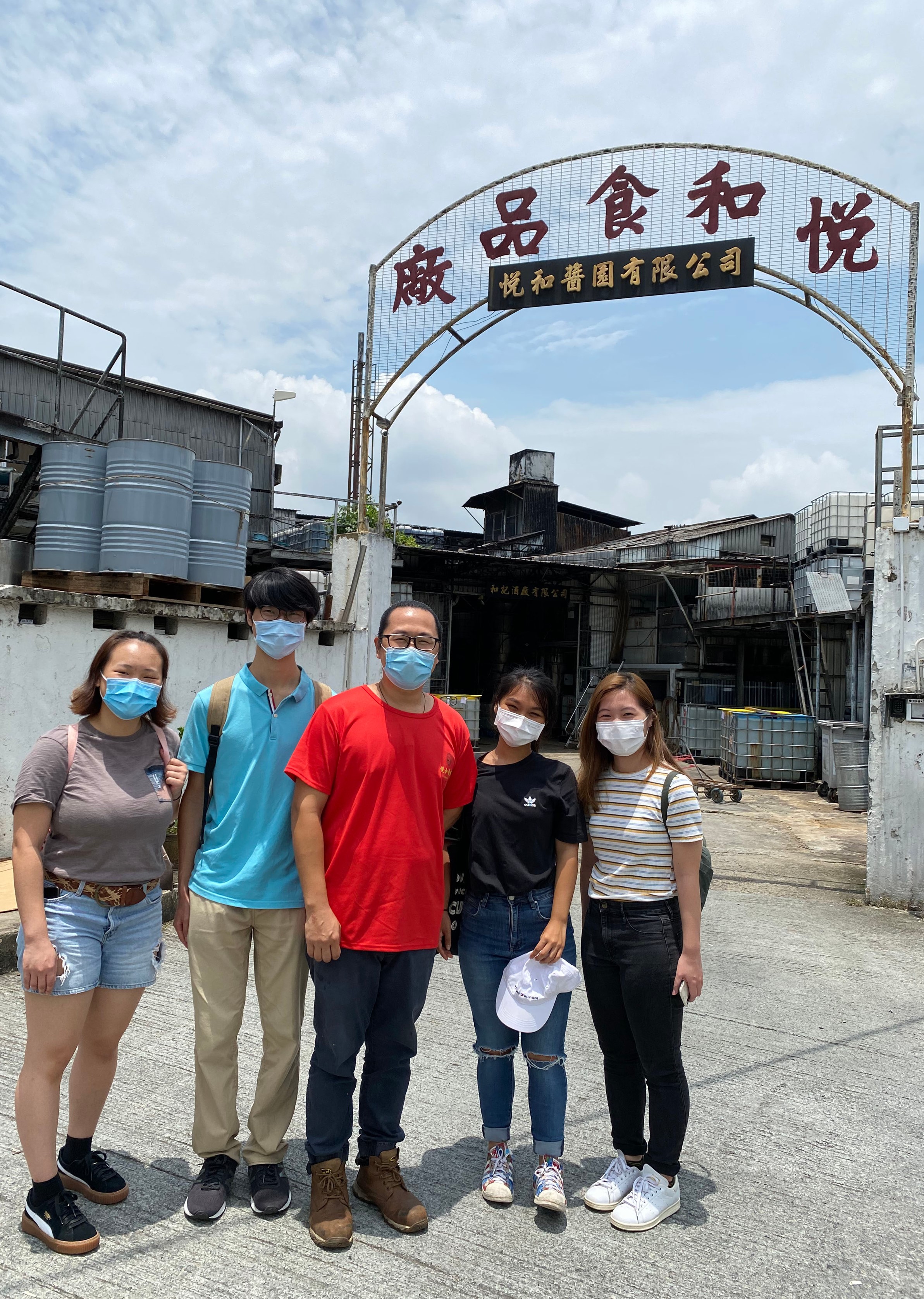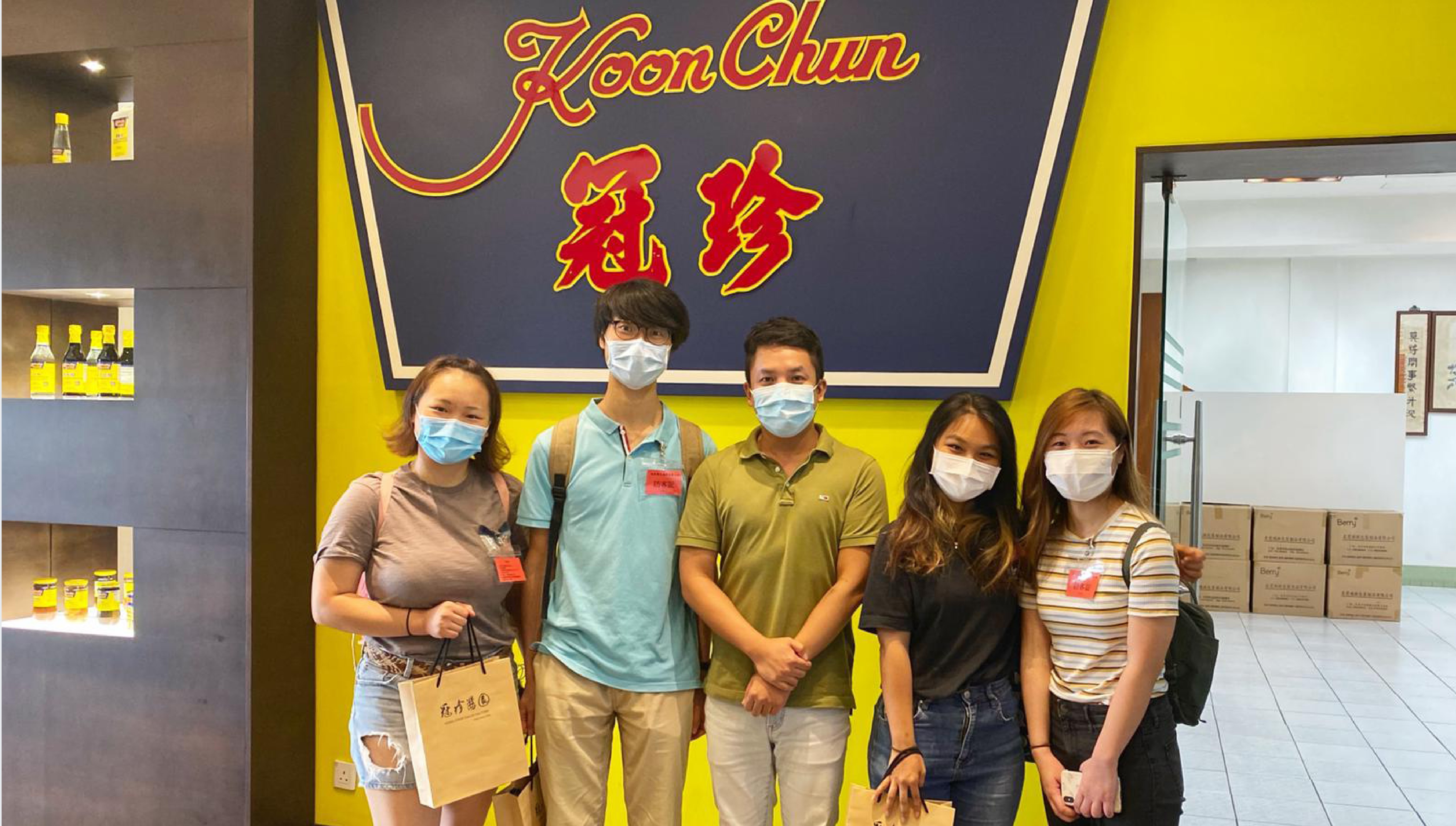
 Campus Newsletter
/ In Dialogue with Excellence
Campus Newsletter
/ In Dialogue with Excellence 

Soy sauce is a traditional seasoning in Guangdong cuisine. In 2014, the local soy sauce production technique was enlisted as Hong Kong Intangible Cultural Heritage (ICH). Four Chung Chi-ers, Mr. Lam Chun Ho majoring in Music, Ms. Ho Yin Lam in Biomedical Sciences, Ms. Law Hiu Ting in Religious Studies, and Ms. Ma Yuen Wei in Quantitative Finance have previously collaborated on the capstone project of the General Education course “GECC3130 Exploration and Discovery”. Driven by the theme “Crises of Inheriting the Local Traditional Soy Sauce Production Technique in Modern Society and Recommendations”, they aimed to explore the challenges encountered in inheriting traditional soy sauce production.


The research team visited Yuet Wo Sauce Factory and interviewed Mr. Jack Pong (middle), the person-in-charge, to find out what crises and challenges encountered by the traditional soy sauce manufacturers when inheriting the local heritage.
In the early 20th century, numerous soy sauce manufacturers established a foothold in West Kowloon owing to the city’s favourable geographical location. A wealth of enterprises engaged in producing soy sauce during the post-war period, during which the industry entered its heyday. In recent years, soy sauce produced by modern techniques and imported products have emerged in the local market, becoming the competitors of Hong Kong traditional soy sauce manufacturers, which attach great importance to producing high quality soy sauce. They have no choice but to tackle the challenges of the rising production cost and rent, in addition to insufficient successors, the local soy sauce manufacturing industry has suffered a tremendous decline. As the local soy sauce production technique has been enlisted as ICH, its cultural value is approved by the government and scholars but the public and society show little concern for it, which urged us to ponder over the inheritance of the traditional soy sauce production technique and its future development in the new era.
We visited Yuet Wo Sauce Factory and Koon Chun Sauce Factory to learn more about the current situation of the local soy sauce production technique. Through understanding the changes in soy sauce fermentation, and how the industry players define “traditional craftsmanship”, we recognised how soy sauce manufacturers keep abreast of the changes in modern society in terms of production processes and quality assurance, among others. Besides, we explored how soy sauce manufacturers transform themselves to secure their competitive edge in the market by studying sales performance. Meanwhile, we conducted an online survey to find out how the younger generations consume soy sauce in their everyday life, their purchasing considerations, and their awareness towards local traditional soy sauce, through which we deduced what crises soy sauce manufacturers encounter when inheriting the traditional production technique. We made recommendations and hope such a legacy could be passed on to the next generations.


The research team members, Ms. Ho Yin Lam (1st left), Mr. Lam Chun Ho (2nd left), Ms. Law Hiu Ting (2nd right), and Ms. Ma Yuen Wei (1st right), visited Koon Chun Sauce Factory and interviewed Mr. Daniel Chan (middle), the person-in-charge, to explore the history and prospects of the local soy sauce manufacturing industry.
We had significant findings from five major aspects. First, the issue of modernisation. Hong Kong people have become more alert to food safety. Soy sauce manufacturers have to upgrade production equipment and formulate the standard manufacturing process so as to ensure food safety through quality assurance. Mechanisation can also help relieve the ageing workforce and labour shortage. Concerning land development, some manufacturers suffer land clearance enforced by the government due to land shortage, and need relocating their factories. However, it takes much time and money to rebuild factories. Some manufacturers may be on the verge of closure due to fund shortage. In addition, the survey results reflected that a majority of respondents do not have a thorough picture of the traditional soy sauce production process and its history. Their low awareness makes the inheritance of this craftsmanship even more difficult. Nowadays, Hong Kong people prefer non-locally produced soy sauce. As there is a broad variety of soy sauce products, manufacturers consider launching more innovative items to raise their competitiveness. Despite the increasing demand for soy sauce after the pandemic, traditional soy sauce manufacturers have to transform physical sales outlets into online channels, such as sourcing appropriate online platforms as new sales channels.
In view of the above, we concluded that soy sauce manufacturers generally adopt an open and flexible approach to overcome crises from the business operation perspective. Meanwhile, traditional soy sauce manufacturers take pride in their customary craftsmanship and strive to preserve their legacy. The persons-in-charge today are also dedicated to passing on and promoting the craftsmanship to the next generations, in the hope of safeguarding this local heritage.
